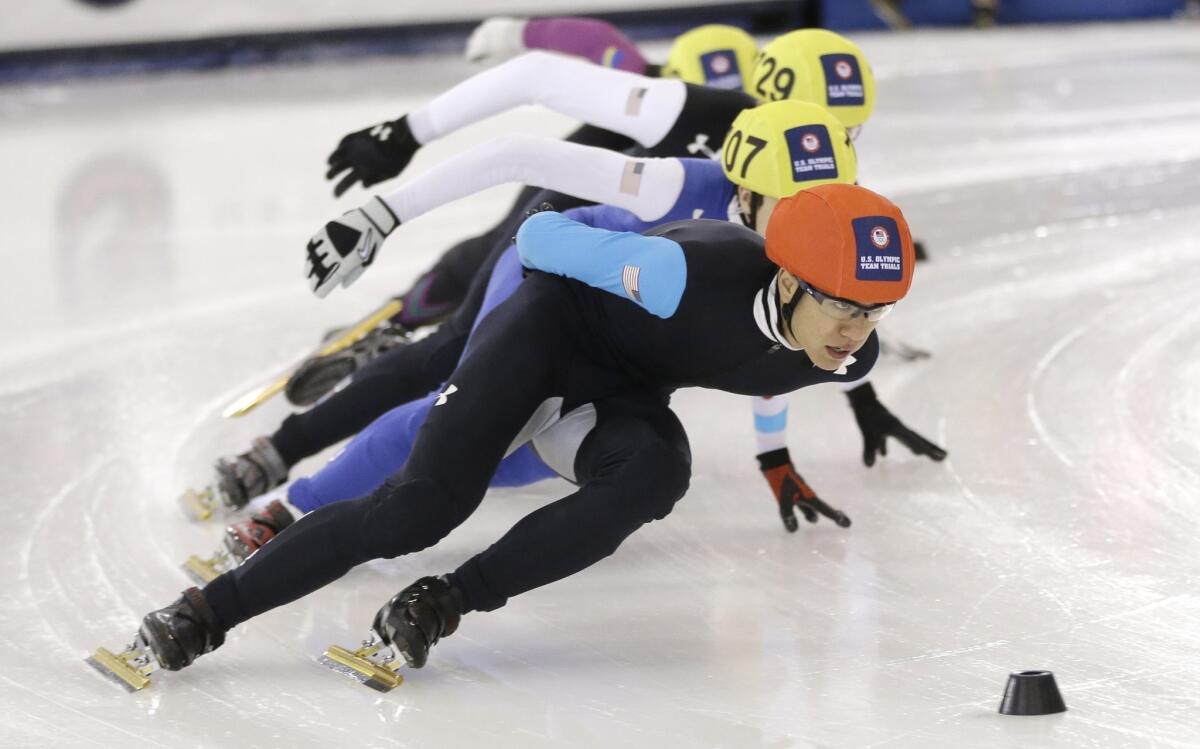Is the world ready for Ice Derby? Promoters want to find out

- Share via
Jack Mortell leaned in and his eyes widened at the scenario he dreamed up: Who would win if all the gold medalists in speedskating from the upcoming Winter Olympics faced off against one another?
“I think people would want to know, don’t you?” Mortell asked, grinning. “I think that kind of race would generate some interest.”
Fans may find out.
In May, Mortell and well-heeled investors plan to launch Ice Derby, an entertainment ice show centered on a professional speedskating tour and featuring figure skating and ice dancing. If successful in burgeoning cities such as Dubai United Arab Emirates, Ice Derby could reach the United States.
“It’s bigger than just ice racing,” said Mortell, 60, a retired Illinois firefighter who has been involved in the sport for years. “This is global.”
Speedskaters would compete on a 220-meter track, a middle ground for skaters from the sport’s two disciplines, short track and long track. Purses would be much larger than that of current international competition. And to draw interest and increase profits, spectators would be allowed to bet on the races’ outcomes, not unlike horse racing.
Originally formed in 2006, Ice Derby is the brainchild of Korean investor Do-joung Hyan, who five years later hired Mortell. Mortell is known in the sport as passionate and knowledgeable but also somewhat fiery and bullish. Yet his career — including time as a skater, Olympic coach, an international official and board director to U.S. Speedskating — developed connections he hopes now are bearing fruit.
Ice Derby is the most ambitious attempt to mainstream a sport most of the world watches for two weeks once every four years. Yet four-time Olympic medalist Shani Davis and others have competed in the Netherlands, where the Dutch treat speedskating like Americans do football.
“We will have a living, breathing sport,” Mortell said. “It’s a chance for these athletes to have professional careers.”
Economic development is a major element in the sport’s sales pitches and promotional brochures, and videos outline a multipurpose arena for 9,400 spectators and a sprawling theme park in South Korea.
Supporters point to Keirin racing, a form of Japanese cycling that originated in the late 1940s and is now very popular there. Races are run on loops and call for both speed and maneuvering. Japan boasts about 50 racing velodromes, strict training programs and purses generous enough that participants can make it a career into their 40s.
There is to be a three-day show including speedskating — but no gambling — in Dubai in May. Ultimately, Mortell envisions an annual tour of three or four events, traveling across the globe in a grand prix style.
Foreign investors have pledged more than $500 million, according to copies of the promoters’ financial agreements. Mortell said he hopes for U.S. investors soon.
Davis isn’t the only big name supportive of Ice Derby. Apolo Ohno has attended meetings and helped make pitches. Promotional materials include Eric Heiden, considered the greatest speedskater of all time.
“The Ice Derby thing is starting to pick up,” Davis told reporters at the recent U.S. Olympic trials when asked about life after the games in Russia. “If I keep myself in good shape after the Olympics maybe I’ll give that a try.
Invitations will start with Olympians, a fertile pool of candidates that will grow with the Winter Olympics in Sochi, Russia. In 2006, 88 skaters won Olympic medals; there were 86 medalists in 2010.
Ice Derby could fill a hole for many athletes who abandon their sport after the Olympics because they can’t make a living at it.
“I was always very jealous of the figure skaters who could do ice shows and basically make a decent living out of what they thoroughly loved and enjoyed” after they were done competing as amateurs, said Bonnie Blair, a five-time Olympic gold medalist speedskater who supports the project. “Once we were done with the Olympics, you were done.”
There remain at least two issues the Ice Derby promoters must overcome: gaining approval of wagering and the endorsement of the International Skating Union, which oversees the sport.
In Kierin racing, gambling is an essential ingredient and helps generate millions. But the sport has faced scrutiny for race fixing and other problems, and has added stricter regulations over the years.
“I’d be really concerned about the betting component in something like that at this time,” said Mike Plant, president of U.S. Speedskating and former president of U.S. Cycling.
Olympic gold medalist Dan Jansen, now a speedskating commentator said, “That’s why I think it would be difficult to have cooperation” with the ISU.
The Switzerland-based ISU requires skaters compete in sanctioned events or otherwise they can be suspended, so its endorsement would make the difference between using current skaters or just retired ones. The ISU is reviewing Ice Derby, a spokesman said.
Mortell said Ice Derby would be “cutting our throats” if it tried to circumvent the Ice Skating Union. He said events would be held in speedskating’s off-season, typically the spring and summer.
So far, the betting component would make Las Vegas the only U.S. city for Ice Derby. But investors also are interested in New Jersey, where Gov. Chris Christie has challenged the federal law that limits sports betting in the United States.
Mortell said TV remains a goal, despite the fact speedskating is rarely televised except for the Olympics and Olympic trials.
“You don’t need to capture everyone,” Mortell said, noting that the Ultimate Fighting Championship was dismissed before turning into a mainstream moneymaker.
For example, Hyan, Ice Derby’s founder, isn’t even a fan.
“He’s a businessman,” Mortell said. “He wants to make money.”
More to Read
Go beyond the scoreboard
Get the latest on L.A.'s teams in the daily Sports Report newsletter.
You may occasionally receive promotional content from the Los Angeles Times.






